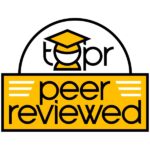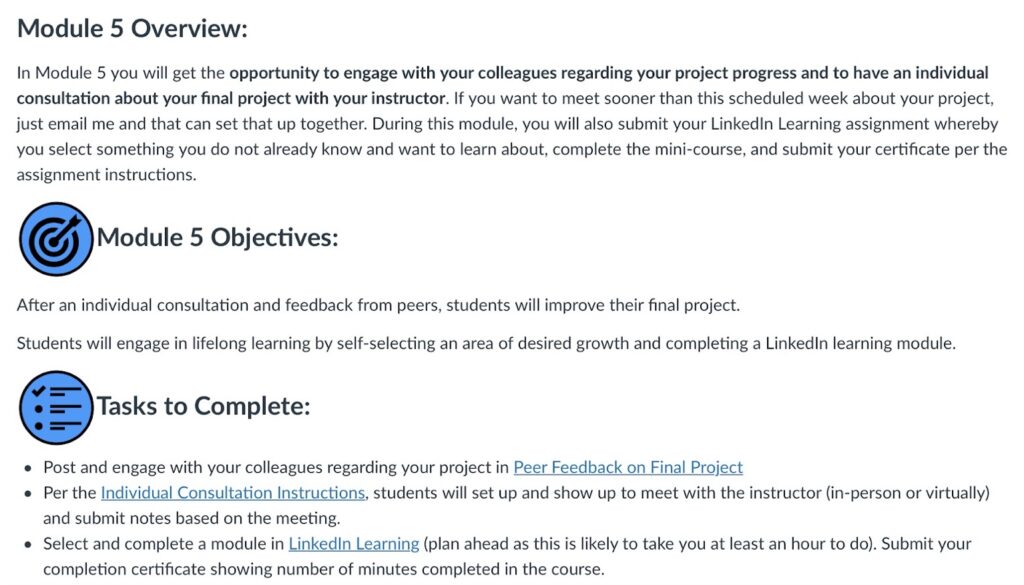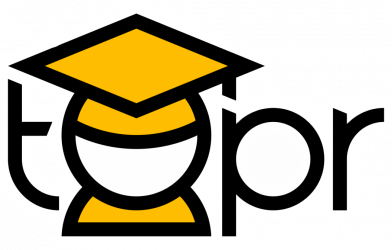Tags: Conversations, Humanized Strategies, Interaction, Peer-Reviewed Entry, Relationships

Description
Faculty who teach asynchronously online must build-in purposeful engagement activities with their students to grow the faculty-student relationship. It is this purposeful effort towards relational humanity that allows students to see their professors as real people who care about their success and learning, rather than grading robots hidden behind a screen. Relational humanity is the “Purposeful deepening of relationships as humanitarian [action in] showing others that we care about their well-being and welfare as fellow human beings” (Eadens & Eadens, 2021, p. 282).
Deci and Ryan’s (1985) self-determination theoretical framework posited that internal motivation is nurtured through autonomy, competency, and relatedness or a sense of belonging. However, this requires a place, a presence, and a community for students to experience and feel.
In asynchronous online teaching, faculty strive to nurture students’ internal motivation. Unfortunately, faculty have been additionally challenged with teaching from a digital ‘non-place’ during the COVID-19 pandemic. Faculty are increasingly purposeful with efforts toward relational humanity. Fortunately, this leads to additional relationship-building, trust, and equity in students’ educational experiences. Faculty demonstrated a higher willingness to adapt and revise teaching to better meet the needs of students with an increased focus on relational humanity between faculty and student (Eadens & Eadens, 2021; Hadar et. al., 2020; Cutri, Mena, & Whiting, 2020). Now, the pandemic has enabled educators to reevaluate policies regarding late work, compassion, and connections between coursework and life. From the lens of a pandemic education experience, many faculty are more resolved to seize the power of relationship as integral to asynchronous online instruction as they strive for approaches to better understand student experiences and perspectives.
Asynchronous online classes exist in a myriad of configurations and varied experiences. Smaller online classes may liberate opportunities for one-on-one connection that might not be possible in classes larger than 100 students. This individualized connections strategy is best suited for small online courses and is a simple strategy: a required one-on-one consultation and conversation with the professor. Without the required consultation, many students likely would not attend a meeting during in-person or virtual office hours, nor speak to their professor in real time. Requiring a one-on-one session during the semester that accommodates the student’s other life limitations empowers the space for a faculty-student connection to more fully develop and flourish, one that demonstrates responsiveness, engagement, and resourcefulness.
Faculty should be prepared to adjust their work schedules to offer sessions outside of typical working hours based on the needs of their students and should prepare a plan for each consultation. The result is that faculty could have an opportunity to see their classes anew and students will likely feel recognized and valued for their input. This kind of partnership in the teaching and learning process plays an important role in online coursework and community-building. For example, faculty can recognize and value student perspectives on coursework, their lives in and out of the classroom, and how these relate to their goals to establish a sense of student autonomy. They can partner with students in the possibilities of connecting past experience to carrying forward what they learn in the course to help them reach future goals as a way to recognize competency. Ultimately, they can use genuine inquiry into a student’s well-being, both in the classroom, and in their everyday lives to promote relatedness, hence, relational humanity.
Link to Example Artifact(s)
Implementation in IDS 4939 Senior Seminar (Dr. Danielle M. Eadens & Dr. Devon Cadwell Bazata)
Within this asynchronously delivered online capstone course for the Bachelor in Integrative General Studies major, each faculty member has a required consultation with each student to discuss their final capstone project. These consultations generally range from 15 minutes to an hour. Students are required to set up the meeting in advance and can select the modality of their choice. Pre-pandemic this included face-to-face on campus, video call (e.g., Zoom), or telephone call. Students discuss the course, their project progress, and future plans with their professor (Figure 1).

Implementation During the Pandemic and Beyond
During the pandemic, Drs. Cadwell Bazata and Eadens collaboratively adjusted their approaches to allow more time to meet with each student and build in time to check in with them human-to-human to let them know they were cared for, make sure they were okay, and discuss their future plans.
Dr. Danielle Eadens notes, “I added one simple question to the beginning of my conversations with students, ‘As a human being in the middle of a pandemic, I just want to see how you are doing human-human.’ Then, I gave them time to gather their thoughts and actively listened to what they were telling me. Some answered through tears; others gave me an opportunity to celebrate a new job or baby with them. I learned more about my students than through any other course activity. I heard about loss of family members, financial struggles, emergency schooling struggles, etc. Usually, the student’s response lasted less than five minutes, but it was a powerful moment of connection. It allowed me to see my students in a different way, showed them how much I care, and then I was able to refer them to services through UCF if needed. Several students showed a marked difference in performance level between pre- and post-consultation, and I continue to use some form of a relational-humanity/human connection in the start of all my consultations.”
Dr. Devon Cadwell Bazata adds, “I start facilitating trust and equity in my relationship with my students from the first introductory discussion post in which I reply privately to them and recognize their experience and expertise, and validate their perspective and the positive contribution it will bring to the course. I follow up with a consultation by phone or Zoom in the second week of class, a time when students seem to be uncertain about their ability to live up to course expectations while they balance other life responsibilities. These conversations and relationship-building interactions continue throughout the semester and serve as a way to reassure students that they matter, that their presence and contributions are valued, and that I am an ally who is working with them and an advocate for their success.”
Summary of Recommendations
In an asynchronously delivered course, require a one-on-one consultation and conversation with the professor while purposefully building a community of connection through the course activities.
In planning for this individualized consultation, consider these recommendations:
- Start with a connecting question, e.g. “Human to human, how are you?”
- Enter the consultation with a plan.
- Adjust faculty work schedule to offer sessions outside of typical working hours based on the needs of students.
- During the conversation, focus on connectedness and student empowerment.
- Discuss the student’s future plans, so the student knows that the faculty member is an advocate for their success in the course and beyond.
Link to Scholarly References
Cutri, R. M., Mena, J., & Whiting, E. F. (2020). Faculty readiness for online crisis teaching: Transitioning to online teaching during the COVID-19 pandemic. European Journal of Teacher Education, 43(4), 523–541. Advance online publication. doi:10.1080/02619768.2020.1815702
Deci, E. L., & Ryan, R. M. (1985). The general causality orientations scale: Self-determination in personality. Journal of Research in Personality, 19(2), 109-134.
Eadens, D.M., & Eadens, D.W. (2021). Pivoting to deeper experiences in education. In Thornburg, A., Ceglie, R., & Abernathy, D. (Eds.) Handbook of research on lessons learned from transitioning to virtual classrooms during a pandemic, pp. 277-290. https://www.igi-global.com/book/handbook-research-lessons-learned-transitioning/255922
Citation
Pratt, D.M., Cadwell Bazata, D., & Eadens, D.W. (2022). Foster individualized connections to build relational humanity between faculty and student. In A. deNoyelles, A. Albrecht, S. Bauer, & S. Wyatt (Eds.), Teaching Online Pedagogical Repository. Orlando, FL: University of Central Florida Center for Distributed Learning. https://topr.online.ucf.edu/foster-individualized-connections-to-build-relational-humanity-between-faculty-and-student/.Post Revisions:
- March 26, 2024 @ 16:27:32 [Current Revision]
- June 24, 2022 @ 12:25:33
- June 24, 2022 @ 11:39:07

